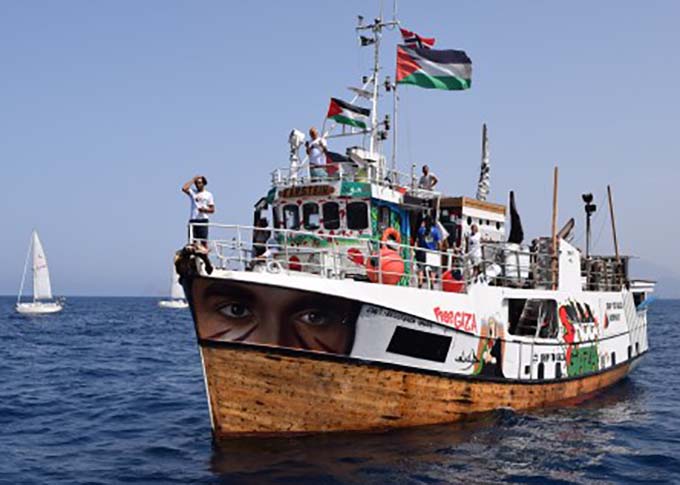Activists describe violence and threats by Israeli naval commandos in international waters. Right-wing organization attempts to take ownership of the boat.

The Israeli Navy seized a fishing boat attempting to break the siege on Gaza Sunday. According to activists on board, naval commandos tasered the boat’s first officer in his face, punched another crew member in the face, and threatened the life of the captain.
There were 22 participants and crew members aboard “Al Awda,” “The Return” in Arabic. The Norwegian boat was one of several ships this summer attempting to break the siege and bring aid to Gaza, an effort that has taken place yearly for nearly a decade.
“We started to receive radio messages on Sunday,” recalled Zohar Regev, one of two Israeli participants onboard the ship. “We responded that we are a Norwegian ship exercising its right to sail in international waters.”
Several hours later, Israeli Navy Zodiac boats approached the ship and Israeli commandos, dressed in all white uniforms complete with white ski-masks, boarded with tasers drawn. Most of the participants attempted to create a human chain and nonviolently block the naval commandos’ access to the ship’s bridge with their bodies, according to the activsts.
The naval commandos tased First Officer Charlie Andreasson in his face, Yonatan Shapira, the second Israeli activist onboard the ship said, adding that the activists did not resist violently. The Israeli sailors also punched the ship’s mechanic in the face, and tasered two others onboard, including a 60-year-old from New Zealand, according to Shapira.
“They slammed Herman the captain’s head against the wall again and again, while threatening to take him to the ship’s belly and finish him off when no one is watching,” Shapira recalled.
“We knew that we weren’t going to break the siege, and that wasn’t the purpose,” Shapira explained. “The aim was international pressure. The goal was to wake and encourage other activists — who suddenly see all these people on a simple fishing boat sailing to Gaza — to mobilize and help out.”
Israeli naval forces towed the boat, which it seized in international waters, to Ashdod and turned all of the activists over to Israeli police. The two Israelis were threatened with charges of aiding the enemy, trying to enter Gaza, and conspiring to commit a crime, said Shapira, although the first accusation was dropped by the time they were released.
The foreign activists, a mix of Norwegian, Swedish, Spanish, French, British, Malaysian, Australian and New Zealand nationals, were held for several more days. They had all been deported by Friday.
An Israeli military spokesperson said that following an investigation, the ship was taken over “with reasonable force while faced with resistance” from those on the boat. “There was no incident that qualifies as irregular in relation to previous incidents over the years,” the spokesperson added.
Last month, Shurat HaDin, a right-wing legal organization that works closely with the Israeli government and intelligence services, obtained a court order to seize “Al-Awda” and another ship, “Freedom,” on behalf of a group of terror victims.
The argument made in court was that the ships would surely fall into the hands of Hamas, thereby increasing the size of the militant Palestinian group’s naval force.
“We have documents proving that the ship was intended for the UAWC — the Union of Agricultural Work Committees — for the benefit of Gaza fishermen,” Zohar Regev said after her release from custody.
“It is a very strange decision,” Attorney Gaby Lasky, who represented the activists, said of the injunction to seize the boat, which was issued before it was actually involved in something illegal.
“The decision to seize the property was made ex parte,” Lasky said, adding that she doesn’t believe the order will stand up in court.
A longer version of this article was first published in Hebrew on Local Call. Read it here.


